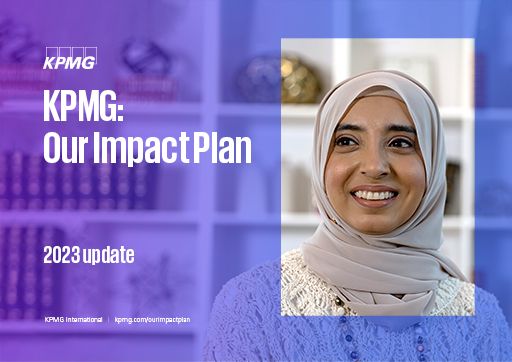KPMG is committed to reaching net-zero carbon emissions by 2030. This requires halving our carbon emissions by 2030 — while continuing to look at how we address climate change, water pollution, deforestation and biodiversity loss. We’re implementing sustainable practices within our global organization and evaluating our supply chain to help ensure a healthy planet for generations to come. What we do internally mirrors the services we provide to our clients as we work across sectors, helping to ensure long-term protection from the worst effects of the climate crisis.
Our commitments mirror the policy and science resulting from COP events, the UN Sustainable Development Goals and the wider international community. We don’t operate in isolation, which is why we set a science-based target (SBT) and why we’ve developed our approach to nature and biodiversity, climate risk and circularity in our journey to net zero. Our role as a trusted adviser to our clients, the influence we have across our value chain and the impact we have in our wider communities are guided by these frameworks.

“We’re working together with businesses, government and stakeholders to help ensure the world is able to transition to net zero in a fair and just way. This will require collaboration, innovation and a willingness to invest in the future of the planet.“
Our route to net zero


Energy efficiency
Renewables
Travel
Supply chain
Circularity
Nature positive
Carbon removals
As a global organization and provider of environmental, social and governance (ESG) services, we have a responsibility to look at the impact of our operations and play our part in the global decarbonization effort. Our focus has been on reducing emissions and collecting more accurate data to support this effort and understand where we need to focus our energy in the years ahead. Decarbonization is critical to our collective net-zero efforts, and our goals are aligned with the 1.5 °C Paris Agreement target, with a near-term SBT to decarbonize our business by 50 percent by 2030, compared to our FY19 baseline.
Our carbon greenhouse gas footprint
We had a nine percent emissions reduction from last year, and a 25 percent reduction against our FY19 baseline year. We also saw a reduction to 38 tCO2e per US$1 million revenue (net), from a baseline year value of 60. Compared to last year’s figures, while our overall gross emissions have decreased, we’ve seen noticeable increases in certain areas, which can largely be attributed to the gradual relaxing of pandemic restrictions globally.
With the updated FY21 emissions data, we saw an increase in Scope 1 emissions in our FY22 figures. We can attribute part of this to an increase in office-based working, with the most significant increase due to business travel (which was expected as we returned to our offices and visited client sites). While we’ve seen a modest increase in Scope 2 energy and gross emissions, a larger proportion of electricity sourced is renewable and highlights progress toward our ambition to use 100 percent renewable energy across the global organization by 2030.
The most significant increase (relative to FY21) was in our Scope 3 business travel emissions (where air travel is captured). While this increased by approximately 230 percent compared to FY21, it’s 37 percent of our FY19 baseline and within the range we were hoping to achieve at this stage. These reductions were made possible in part by improved management, a climate-focused view on business travel and the easing of restrictions partway through FY22. Overall, our people took a measured approach to business travel, and we’ll continue to monitor business travel and the impact climate-conscious travel policies are having on our travel emissions.
Our Scope 3 purchased goods and services emissions continue to be our most significant source of tCO2e, even with the change in accounting methodology. This new methodology means we’ll have increased confidence in our data going forward. Our progress toward a low-carbon supply chain, part of our ESG procurement approach, is not just about getting better emissions data — it’s about engaging our suppliers and working with them to help reduce their emissions. As we continue to work with suppliers and enhance our value chain data accuracy, we’ll work toward re-baselining our emissions with this more robust accounting methodology for purchased goods and services.
Overall, we’re making progress on our decarbonization journey while we continue to address a number of challenges. In general, we’re focused on ensuring accuracy in our reporting, and we recognize the need to continuously update our methodology with new areas and realities as they become material (e.g. emissions associated with working from home).
Renewable energy
Source: KPMG International.
Download the full report to explore all our data.
We have a target of sourcing 100 percent renewable electricity across our organization by 2030. As we continue to make progress toward this goal, we’ve hit an interim — and significant — milestone: Reporting KPMG Firms reached the target of 100 percent renewable energy in October 2022 by finding the best solution for their respective regions.
In terms of total electricity usage, the levels remained very similar — demonstrating that despite increased office usage the efficiency initiatives KPMG firms have taken have balanced this. Additionally, the proportion of renewable energy across our global organization increased from 69 percent in FY21 to 79 percent in FY22. The challenge now is to support the remainder of our member firms in sourcing renewable energy to achieve our 2030 goal.
Some of our firms are now looking beyond electricity to help reduce their energy impact. For example, KPMG in Ireland now sources 100 percent biogas for its offices as a replacement for natural gas, chosen for its minimal life cycle emissions as a source of energy, which reduces the life cycle emissions associated with heating the offices.
People of KPMG


Internal carbon price
Building on last year’s report, we set an internal carbon price (ICP) at KPMG International and within our Reporting KPMG Firms. An ICP helps incentivize changes in behavior and ensure climate is integrated into our decision-making process. We set the floor price (i.e. minimum price) at US$15 per tCO2e. We encouraged each participating firm to choose a price that best suited their decarbonization objectives and local market conditions, so ICPs range from US$15 to US$50 per tCO2e across the organization. We will look to deploy this further in the coming years, recognizing the price will likely need to increase over time to help ensure we accurately and appropriately reflect the true impact of climate on our business.
The ICP funds raised will be invested at the discretion of our member firms in decarbonization activities they feel will be most impactful, and we’ve seen a variety of innovative and exciting ideas — from facilities’ efficiency through to nature-based solutions. We’re confident the ICP will continue to be a key tool in our decarbonization journey.
People of KPMG

Circularity
A circular economy reduces material use and the emissions associated with the production of the materials that traditionally go to waste. In FY22, we developed a circularity strategy and roadmap for our operations, including our supply chain. This involved taking a holistic approach that focuses on circular procurement, avoiding waste, optimizing material use and enhancing end-of-life treatment.
We started the process by identifying the key areas to which these circular principles can be applied within the organization, followed by analyzing the current state and spotting opportunities for improvement. The scope of our circular strategy is focused on three key areas: information and communications technology; offices and real estate; and catering and hospitality.
For each of these themes, we’ve developed a roadmap that outlines the initiatives that could be taken to move the organization toward a more circular model — such as offering repaired, recycled or refurbished IT equipment and sourcing circular furniture — and implementing strategies to help optimize material use and lifetime.
Through engagement with member firms, we’re empowering colleagues to understand the concept of a circular economy and where waste is generated across our value chain while providing a framework for implementation and reporting.
The World Economic Forum has estimated that more than half of the world’s gross domestic product (US$44 trillion2) is moderately or highly dependent on natural ecosystems and the rate of degradation in nature over the past 50 years is unprecedented. Business activities contribute to direct and indirect drivers of nature loss, which creates risks — and opportunities — for business and society.
We have a role to play in the transition toward nature positivity. Since our last report, we implemented a biodiversity plan as part of our ambition to become a net-zero business. This includes supporting the global journey toward a nature-positive future through work for our clients and in our operations. We will continue to develop our thinking, aligned to leading practices through initiatives like the Taskforce on Nature-related Financial Disclosures to help ensure our approach to business considers the impact and dependencies on nature.
Our biodiversity approach focuses on the office footprint, employees, external collaborations and suppliers.
Case study
Get in touch
Connect with us
- Find office locations kpmg.findOfficeLocations
- kpmg.emailUs
- Social media @ KPMG kpmg.socialMedia
Our Impact Plan represents the collective environmental, social and governance commitments of independent KPMG firms, affiliated with KPMG International Limited. The data represented in Our Impact Plan is aggregated data from KPMG firms for the 12 months to 30 September 2021 unless stated otherwise. KPMG International Limited is a private English company limited by guarantee and does not provide services to clients. Where the terms “KPMG,” “firm,” “we” or similar references are used without definition, they are intended to refer to KPMG International Limited and the independent KPMG firms. The financial information set forth represents combined information of the independent KPMG member firms that perform professional services for clients, affiliated with KPMG International Limited. The information is combined here solely for presentation purposes. KPMG International Limited performs no services for clients nor, concomitantly, generates any client revenue.
Throughout this webpage, “we”, “KPMG”, “us” and “our” refers to the global organization or to one or more of the member firms of KPMG International Limited (“KPMG International”), each of which is a separate legal entity.
1 A B-score indicates that a company is showing some evidence of managing its environmental impact but is not undertaking actions that mark it out as a leader in its field.
2 Source: Reuters, “Explainer: How close are we to passing 1.5 degrees Celsius of global warming?” 14 November, 2022.



